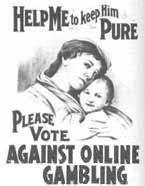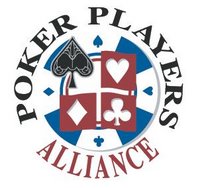Found a Hand Worth Playing
 Still trying to follow the rumpus surrounding the signing of the UIGEA into law and its aftermath. Neteller’s announcement on October 19th was certainly discouraging, although everything remains status quo at present. So I keep playing. Have been putting in some time at the Omaha High-Low tables, actually, following last week’s triumph. Fold. Fold. Fold.
Still trying to follow the rumpus surrounding the signing of the UIGEA into law and its aftermath. Neteller’s announcement on October 19th was certainly discouraging, although everything remains status quo at present. So I keep playing. Have been putting in some time at the Omaha High-Low tables, actually, following last week’s triumph. Fold. Fold. Fold. 


 . A-ha!
. A-ha!As I follow the various discussions and commentaries contemplating what might happen should Neteller finally cease allowing U.S. players to move cash to and from poker sites, I’m starting to believe that while depositing may become relatively more difficult, withdrawing probably will not. All of the poker sites on which I currently play will issue me checks should I request them -- checks which I should in all likelihood be able to deposit directly into my U.S. bank account. These checks are drawn on foreign banks (not poker sites’ accounts) and so should not pose a problem for Americans trying to cash or deposit them. Here’s a thread on the 2+2 Forums where this issue was discussed. (Posters include one person who’s worked with PokerStars support and thus has some knowledge of how checks are issued.)
The trick, of course, will be not to go bust, as redepositing may become a less simple matter. No problem there. I’ll just be sure never to go all in . . . for real, that is . . . !
Of course, other alternatives should emerge once Neteller goes away. Conservative pundit George Will made this point in a recent Newsweek editorial in which he dubbed the UIGEA as “Prohibition II.” Many others have drawn this analogy, of course. (Including me, in a post last summer, complete with that slightly-doctored Prohibition-era poster I've repeated above.) Will notes that just as “Prohibition I was a porous wall between Americans and their martinis, giving rise to bad gin supplied by bad people,” he believes “Prohibition II will provoke imaginative evasions as the market supplies what gamblers will demand -- payment methods beyond the reach of Congress.” (Here’s the full editorial.) This, of course, is the aggressively-posed stance of Allyn Jaffrey Shulman, CardPlayer’s resident legal analyst, who continues to maintain (somewhat blithely, it must be said) that “Online poker is here to stay and the federal government simply cannot ban it.” She, too, is convinced that there will always be alternative methods for Americans to fund their accounts.
 Meanwhile, I’m now one of about 5,000 people who have decided to join the Poker Players Alliance since the UIGEA was rammed through Congress at the end of September. The group now boasts around 120,000 members -- hardly the National Rifle Association (over 4 million strong), but still enough to make some noise. Only 20,000 had signed on back in March, so today’s membership represents a significant increase over the past six months alone. Can't say I've joined too many lobbying groups in my time. But I’ve liked what I’ve heard from Michael Bolcerek, PPA President, regarding the organization’s efforts this summer and their plans for the coming weeks and months. I suppose you could say I've decided that poker is important enough to me to seek ways to fight for it. (A hand worth playing, if you will.)
Meanwhile, I’m now one of about 5,000 people who have decided to join the Poker Players Alliance since the UIGEA was rammed through Congress at the end of September. The group now boasts around 120,000 members -- hardly the National Rifle Association (over 4 million strong), but still enough to make some noise. Only 20,000 had signed on back in March, so today’s membership represents a significant increase over the past six months alone. Can't say I've joined too many lobbying groups in my time. But I’ve liked what I’ve heard from Michael Bolcerek, PPA President, regarding the organization’s efforts this summer and their plans for the coming weeks and months. I suppose you could say I've decided that poker is important enough to me to seek ways to fight for it. (A hand worth playing, if you will.)The passage of the UIGEA has similarly emboldened a lot of other poker players as well. Charles Murray, a scholar at the American Enterprise Institute for Public Policy Research, wrote an editorial in The New York Times last week in which he not only decried the new legislation, but identified himself as an online poker player. (Here’s his editorial, republished in a post over on Lou Krieger’s blog.) Like George Will, Murray comes from the right, politically-speaking, thereby proving that the law has provoked the ire of Republicans and Democrates alike.
Anyhow, I’d encourage others -- particularly Americans registered to vote -- to consider joining the PPA as well. Only requires a one-time, $20 fee, which can be reduced to $15 if you sign up through CardPlayer. Click here for details.
For now, though, it’s back to the tables. Am eyeing that Ante-Up Intercontinental Poker Series event no. 8 scheduled for this Thursday night, the limit hold ’em tourney. Meanwhile, I'll be folding a few more hands of Omaha High-Low. Wish me A-A-2-3 double-suited . . . .
Images: Temperance poster, ca. 1910-15 (adapted), public domain (top); Poker Players Alliance (bottom).
Labels: *the rumble














2 Comments:
Unless sites ban interplayer transfers from non-US to US players then it will always be easy to deposit online. I'd be more than willing to help my cousins from across the pond. All they do is transfer X amounts of dollars to Yorkshire Pudding's bank account, he reloads his Neteller and deposits on said Poker Site then transfers it to Mr US Poker Player. It would all come down to trust I guess but I think there are a few people on the forum I'm a mod for who would trust me or a fellow UK player to handle their funds for them.
Thanks, guys!
Yorkie, I think I've heard about some sites actually blocking player-to-player transfers involving us Yanks, but I'm not sure if that's true or more applesauce . . . .
Post a Comment
<< Home